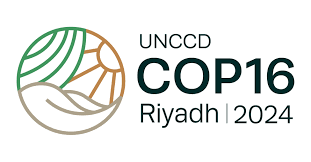India Highlights Green Initiatives at UNCCD COP16 in Riyadh
India recently showcased its green initiatives at the 16th Conference of the Parties (COP16) to the United Nations Convention to Combat Desertification (UNCCD) held in Riyadh, Saudi Arabia. The event brought together countries, stakeholders, and environmental organizations to address critical issues related to land degradation, desertification, and drought. As one of the world’s most vulnerable regions to the adverse effects of climate change, India’s participation at COP16 aimed to emphasize its commitments and efforts towards environmental sustainability and restoration.
India’s significant contributions at the conference included outlining its ambitious plans to combat land degradation. The country’s efforts include large-scale afforestation projects, promoting sustainable land management practices, and introducing innovative solutions to combat soil erosion and desertification. The Indian delegation also highlighted the successful implementation of the Green India Mission, a key initiative to increase the country’s forest cover, restore degraded lands, and improve carbon sequestration.
During the conference, India committed to enhancing its land restoration efforts and aligning them with the United Nations’ 2030 Agenda for Sustainable Development. The country has been actively working on restoring 26 million hectares of degraded land by 2030, as part of its National Action Program for Land Degradation Neutrality (NAP-LDN). India’s efforts are in line with the global push to address land degradation, restore ecosystems, and achieve sustainable land use practices.

Why This News is Important
India’s Global Role in Climate Change Mitigation
India’s participation at COP16 underscores its increasing role in global climate change mitigation. As the world’s third-largest emitter of greenhouse gases, India’s strategies to combat land degradation and desertification are pivotal in the global effort to meet the climate goals outlined in the Paris Agreement. The country’s initiatives not only focus on mitigating environmental damage but also on promoting sustainable development, which is crucial for both economic growth and environmental preservation.
Focus on Sustainable Land Use Practices
The Green India Mission and the National Action Program for Land Degradation Neutrality (NAP-LDN) emphasize the importance of sustainable land use practices in reversing land degradation. These initiatives align with global priorities for sustainable agriculture, biodiversity conservation, and ecosystem restoration. By adopting sustainable practices, India aims to ensure long-term food security and maintain its rich biodiversity.
Strengthening International Cooperation
The COP16 conference provided an opportunity for India to collaborate with other nations and international organizations. By actively engaging in discussions about land degradation and drought resilience, India is strengthening its international partnerships, particularly in the field of environmental governance. This cooperation helps enhance collective action towards a more sustainable future.
Historical Context
The UNCCD and its Objectives
The United Nations Convention to Combat Desertification (UNCCD) was adopted in 1994 to address the global issue of land degradation. The convention’s primary objective is to combat desertification, land degradation, and mitigate the effects of drought through sustainable land management practices. The UNCCD has become a vital platform for countries to discuss and implement strategies for preventing further land degradation, restoring ecosystems, and promoting sustainable development.
India’s Commitment to Sustainable Development
India has been consistently working on enhancing its environmental and climate resilience. Initiatives like the National Action Program for Land Degradation Neutrality (NAP-LDN) and the Green India Mission are significant steps toward this goal. India’s participation in COP16 highlights the country’s growing commitment to sustainable development, which includes restoring degraded lands, increasing forest cover, and addressing the adverse effects of climate change.
Key Takeaways from “India Highlights Green Initiatives at UNCCD COP16 in Riyadh”
| S.No. | Key Takeaway |
|---|---|
| 1 | India showcased its green initiatives at the 16th COP of UNCCD. |
| 2 | India committed to restoring 26 million hectares of degraded land by 2030. |
| 3 | The Green India Mission is central to India’s land restoration efforts. |
| 4 | India’s participation emphasizes global cooperation in combating land degradation. |
| 5 | The country’s efforts align with the UN’s 2030 Agenda for Sustainable Development. |
Important FAQs for Students from this News
What is the UNCCD COP16, and where was it held?
- The UNCCD COP16 (16th Conference of the Parties to the United Nations Convention to Combat Desertification) is an international conference that focuses on combating desertification, land degradation, and drought. It was held in Riyadh, Saudi Arabia.
What green initiatives did India showcase at COP16?
- India highlighted its efforts to combat land degradation, including the Green India Mission, which focuses on afforestation, forest cover expansion, and restoring degraded lands. The country also committed to restoring 26 million hectares of land by 2030.
What is the National Action Program for Land Degradation Neutrality (NAP-LDN)?
- The NAP-LDN is a comprehensive initiative by India to restore land affected by degradation and desertification. It aligns with the global goal of achieving land degradation neutrality by 2030.
How does India’s participation at COP16 contribute to global environmental goals?
- India’s participation at COP16 emphasizes its role in achieving global climate goals, especially regarding sustainable land management, soil conservation, and ecosystem restoration. The country’s commitment to sustainable development supports the UN’s 2030 Agenda for Sustainable Development.
What are the key objectives of the UNCCD?
- The UNCCD’s primary objectives are to combat desertification, mitigate the effects of drought, and promote sustainable land management practices to ensure long-term environmental sustainability.
Some Important Current Affairs Links

















